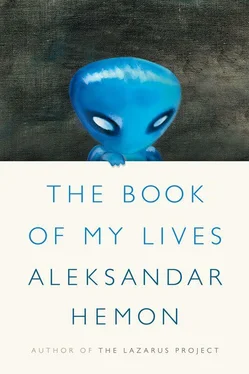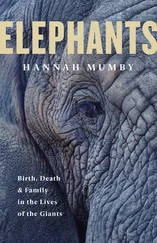It wasn’t clear to me why German was doing it all. Even though I like to think of myself as a reasonably generous person, I could never imagine spending every single weekend putting together soccer games and refereeing, subjecting myself to verbal and other abuse, dismantling the goals and loading up the van long after everybody had left, then washing a large number of T-shirts stinky with worldly sweat. It was clear that without German those pickup games would not be happening, but he never asked for anything in return from us.
I abused for years German’s inexplicable generosity. As we often played in the winter in a church gym in Pilsen, which was beyond the reach of my bike, I’d catch a ride in his clunky “Kick me make my day” van, holding the passenger-side door, whose lock didn’t work. On the way back, I often feared for my life, as German was prone to celebrating the successful completion of yet another game with a few beers — he always had a well-stocked cooler in his van. He’d talk incessantly, driving and sipping beer, telling me about his favorite team of all time (the Cameroon of the 1990 World Cup) or about his search for an heir, someone who’d continue organizing the games once he retired and moved to Florida. He had a hard time finding the right person, he said, because few people had the guts to commit. He never suggested that I take over, which slightly offended me even if I knew that, gutless as I was, I’d never be able to do it.
Once, during a bloodcurdling ride home on the icy streets of Chicago, I asked him why he was doing it all. He was doing it for God, he said. God had instructed him to put people together, to spread His love, and that became his mission. I was uncomfortable, afraid that he might proselytize, so I didn’t ask him anything beyond that. But he never asked people about their religion, never flaunted his faith, never tried to call them to the Lord; his faith in soccer was unconditional; people’s belief in the game was enough for him. He told me that, after his retirement, he was planning to buy a piece of land in Florida and build a church, and put a soccer field next to it. He was planning to spend the rest of his life preaching. After the sermons, his flock would play and he would referee.
A few years after that conversation, at the end of the summer, German retired. One of the last weekends before he stopped showing up by the lake, we were playing in sweltering heat. Everybody was testy; hummingbird-size flies were ravenous; the field was hard, humidity high, humility low; a few scuffles broke out. The sky was darkening over the line of skyscrapers along Lake Shore Drive, rain simmering in the clouds, about to boil over. And then a cold front hit us, as if somebody had opened a gigantic cooler, and rain arrived abruptly. I’d never seen anything like that: the rain started at the other end of the field and then moved across it toward the far goal, steadily advancing, like a German World Cup team. We bolted away from the rain, but it quickly caught up with us and in no time we were soaked. There was something terrifying about the blind power of the sudden weather shift, about its violent randomness — as rain washed in waves over us, nothing depended on our minds or wills.
I ran toward German’s van, as toward an ark, escaping the flood. There were other guys there already: German; Max from Belize; a man from Chile (consequently known as Chile); Rodrigo, German’s mechanic, who miraculously kept the van alive for more than twenty years; and Rodrigo’s droopy, bare-chested buddy, who didn’t seem to speak English at all, sitting on the cooler, occasionally handing out beers. We took shelter in the van; the rain clattered against the roof, as though we were in a coffin, somebody dropping shovelfuls of dirt on us.
So I asked German if he thought he’d be able to find people to play with in Florida. He was sure he’d find somebody, he said, for if you gave and asked for nothing in return, someone was bound to take. Suddenly inspired, Chile rambled off something that seemed to be a badly learned lesson from a New Age manual, something vapid about unconditional surrender. People in Florida are too old and they can’t run, I said. If they’re old, German said, they are close to entering eternity, and what they need is hope and courage. Soccer would help them on the way to eternal life, he said.
Now, I’m an atheist man, vain and cautious. I give little, expect a lot, and ask for more — what he was saying seemed far too heavy, naïve, and simplistic. It would have, in fact, seemed heavy, naïve, and simplistic if the following was not taking place:
Hakeem, the Nigerian who somehow found a way to play soccer every day of his life, runs up, soaked, to the van and asks us if we’ve seen his keys. Are you out of your mind, we say, as the rain is pouring through the window. Can’t you see it’s the end of the fucking world, look for your keys later. Kids , he says, I’m looking for my kids . Then we watch Hakeem running through the rain, collecting his two terrified kids hiding under a tree. He moves like a shadow against the intensely gray curtain of rain, the kids hanging on his chest like little koalas. Meanwhile, on the bike path, Lalas (nicknamed after the American soccer player) stands beside his wife, who is in a wheelchair. She has a horrific case of fast-advancing MS and cannot move fast enough to get out of the rain. They stand together, waiting for the calamity to end: Lalas in his Uptown United T-shirt, his wife under a piece of cardboard slowly and irreversibly dissolving in the rain. The Tibetan goalie and his Tibetan friends, whom I’d never seen before and never would after that day, are playing a game on the field, which is now completely covered with water, as if running in slow motion on the surface of a placid river. The ground is giving off vapor, the mist touching their ankles, and at moments it seems that they’re levitating above the flood. Lalas and his wife are perfectly calm watching them, as if nothing could ever harm them. (She has passed away since that day, somebody rest her soul.) They see one of the Tibetans scoring a goal, the rain-heavy ball sliding between the hands of the goalie, who lands in a puddle. He is untroubled, smiling, and from where I sit, he could well be the Dalai Lama himself.
So this, ladies and gentlemen, is what this little narrative is about: the rare moment of transcendence that might be familiar to those who play sports with other people; the moment, arising from the chaos of the game, when all your teammates occupy an ideal position on the field; the moment when the universe seems to be arranged by a meaningful will that is not yours; the moment that perishes — as moments tend to — when you complete a pass. And all you are left with is a vague, physical, orgasmic memory of the evanescent instant when you were completely connected with everything and everyone around you.
THE PATINA
After German left for Florida, I played in a park at Belmont, south of Uptown. It was a wholly different crowd: a lot more Europeans, thoroughly assimilated Latinos, and a few Americans. Often, when I got too excited and demanded, shall we say, that other players stay in their position and play for the team, someone would tell me, Relax, it’s just exercise…, whereupon I’d suggest that if they couldn’t play the way the game’s supposed to be played, they should fuck themselves and go and run on a fucking treadmill. No Uptown player would’ve ever said a thing like that. Relaxation never played any part in our game.
One of the Belmont people was Lido, a seventy-five-year-old Italian. Even the slowest ball was capable of outrunning him, so when the teams were picked he was never counted as a player — we just tolerated his being on the pitch, safe in the assumption that he would have little impact. Like many a man over fifty, Lido was totally delusional about his physical prowess. He truly believed he was still as great a player as he might’ve been some fifty years ago. Topped with a lamentable toupee he never failed to wear, which would turn to cover his eyes if he headed the ball, he was prone to discussing, after he lost the ball, all his brilliant intentions and all your obvious errors. Lido was a good, decent man. (He passed away in 2011, somebody rest his soul.)
Читать дальше












